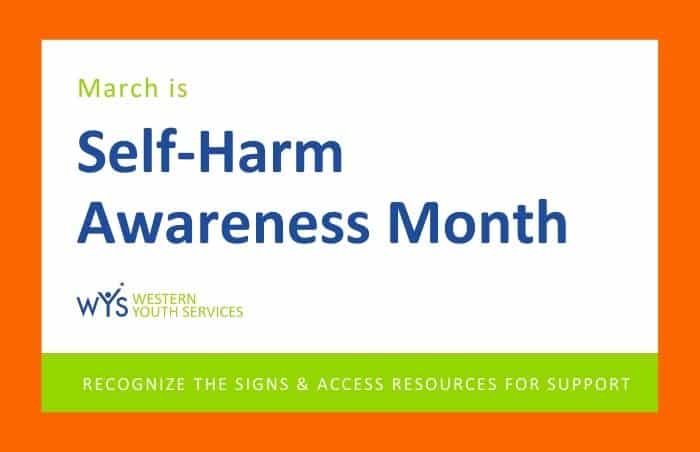
As March approaches, so does a crucial time for mental health awareness – Self-Harm Awareness Month. At Western Youth Services, we believe in the power of knowledge, understanding, and support to break the stigma surrounding self-harm and provide assistance to those who need it most. In this blog post, we aim to shed light on this critical issue by discussing the signs of self-harm and providing valuable resources for youth who may be struggling.
Recognizing the Signs
Self-harm manifests in various forms and often serves as a coping mechanism for individuals experiencing overwhelming emotions or distress. It’s essential to be vigilant and observant, as the signs of self-harm may not always be obvious. Some common indicators to watch for include:
- Unexplained cuts, bruises, or scars on the body, particularly in areas that are easily concealed.
- Wearing long sleeves or pants even in warm weather to hide marks or injuries.
- Withdrawal from social activities or sudden changes in behavior, such as becoming more isolated or secretive.
- Increased sensitivity to touch or pain.
- Finding sharp objects like razors, knives, or scissors hidden in their belongings.
- Expressing feelings of worthlessness, hopelessness, or an inability to cope with emotions.
Resources for Support
If you suspect that a youth may be engaging in self-harm, it’s crucial to approach the situation with empathy, compassion, and non-judgment. Here are some resources that can provide assistance and support:
- Western Youth Services: Our organization offers counseling, therapy, and support groups specifically tailored to address self-harm behaviors and promote mental wellness among youth. Our team of experienced professionals is here to listen, understand, and guide individuals toward healing and recovery.
- National Suicide Prevention Lifeline (1-800-273-TALK): This 24/7 helpline provides free and confidential support to individuals in distress or crisis. Trained counselors are available to offer emotional support, crisis intervention, and resources for those struggling with self-harm or suicidal thoughts.
- Crisis Text Line: By texting HOME to 741741, individuals can connect with a trained crisis counselor who can provide support, encouragement, and resources via text message. This service is available 24/7 and is free, confidential, and accessible from anywhere in the United States.
- Therapy and Counseling Services: Seeking therapy or counseling from a licensed mental health professional can be instrumental in addressing underlying issues contributing to self-harm behaviors. Therapists can provide a safe space for individuals to explore their emotions, develop healthier coping strategies, and work towards healing and recovery.
- Online Support Communities: There are various online forums, support groups, and communities where individuals struggling with self-harm can connect with others who understand their experiences. These platforms offer a sense of belonging, validation, and solidarity, which can be invaluable on the journey towards recovery.
As we observe Self-Harm Awareness Month, let us reaffirm our commitment to promoting mental health awareness, destigmatizing self-harm, and providing support to those in need. By recognizing the signs of self-harm and offering resources for assistance, we can play a vital role in saving lives and fostering healing and resilience among youth in our communities. Together, let’s strive to create a world where everyone feels seen, heard, and supported on their journey towards mental wellness.
If your child or a young loved one is struggling with a mental health concern, we encourage you to reach out to a mental health professional or to contact an Access Coordinator at Western Youth Services by sending an email to [email protected] or by calling us toll-free at 888-312-0406.
Orange County, State and National resources can be found on our site here: https://www.westernyouthservices.org/resources/.






